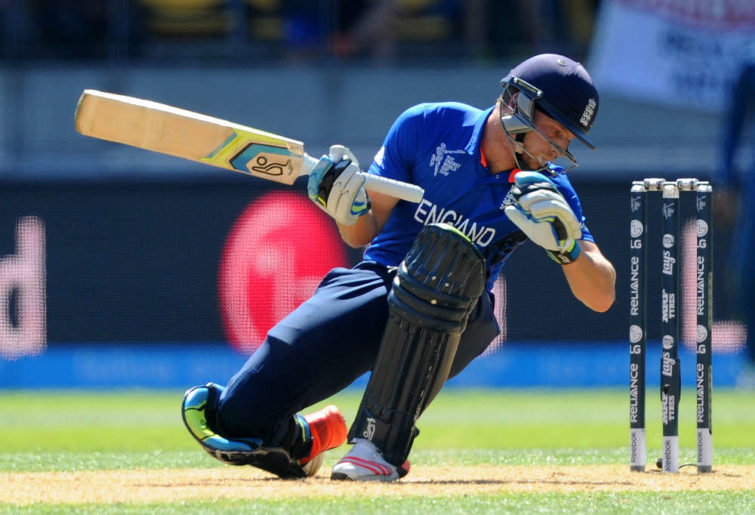Look after the singles and the sixes will look after themselves. Look after the sixes and the singles will look after themselves.
Sixes have become commonplace in modern cricket. It sometimes seems like batsmen can hit sixes at will, only deigning to run ones and twos as a bemused concession to the quaint nineteenth-century traditions of the sport.
When England racked up 481-6 against Australia last year, and when Eoin Morgan scored his 17 sixes against Afghanistan just a few weeks ago, it seemed like a matter of time before one of these teams of biological robots would make 1800-0 at 36 runs per over.
But a tricky pitch, relentlessly good bowling, and the pressure of a World Cup final combined to unmake reality. New Zealand and England scored just two sixes each. As soon as Martin Guptill got out early in the innings, New Zealand committed themselves to running ones and twos, minimising risk in order to eke out a defendable total.
They only managed 13 fours alongside their two sixes – a tally which would come back to haunt them – and the most boundaries by a single player was a mere four, from Henry ‘Nudger’ Nicholls. Look after the singles and the sixes will look after themselves.
In contrast, England seemed hell-bent on hitting boundaries early in their innings. Despite only batting at a strike rate of 65.64, Jonny Bairstow hit seven fours in an innings of 36.
On such a pitch, the desperation to hit boundaries got England into deep trouble. Colin de Grandhomme managed to slip in ten overs of slow-medium pace at less than 3 an over.
Joe Root, normally an effortless accumulator of singles, became decidedly skittish, even frenetic – eventually he went chasing a big drive off De Grandhomme and was on his way for 7 off 40, with no boundaries at all.
Look after the sixes and the singles will look after themselves – but the sixes weren’t coming and the singles weren’t either, as England got thoroughly stuck. At 86-4, one more bad shot would almost certainly cost them the Cup.
It fell, counter-intuitively, to two of England’s most powerful and inventive boundary-hitters, Jos Buttler and Ben Stokes, to recover the art of knocking the ball into gaps and rotating the strike.

Jos Buttler dodges a bouncer. (Photo: AFP)
Stokes and Buttler hit just two fours between the 24th over (when they came together) and the 37th. In that time, they dragged England to 143-4, within 100 of the target. Even after they started to accelerate, boundaries didn’t come easily.
Almost all of Buttler’s six fours felt fraught – a scoop, a couple of chancy drives over the head of extra cover.
Stokes still wasn’t hitting it cleanly. They looked after the singles brilliantly and it got them back into the match – but the sixes weren’t looking after themselves. After Buttler departed, miscuing a big hit to the offside, England still wanted 46 off just 30 balls.
New Zealand’s bowling was relentless, offering few bad balls to put away to the fence; the pitch was slow and treacherous, and the batsmen were struggling to hit the ball cleanly; the pressure of the situation was surely getting to England’s lower-order; and to cap it all, Ben Stokes was visibly flagging.
They had done just enough to stay in the hunt, but when Liam Plunkett departed halfway through the penultimate over, they still needed 22 off nine balls. They couldn’t do it in singles; even fours might not be enough; they needed sixes.
The sixes looked after themselves in the most extraordinary fashion. First, Stokes – in what looked like pure desperation – clubbed the ball to midwicket. Trent Boult ran backwards, got under the ball, took the catch – and trod on the rope.
Martin Guptill, in a characteristically Kiwi act of sportsmanship, signalled six to the umpires and Stokes. England were back in it, but one run and a wicket followed from the next four balls. Stokes turned down singles to keep the strike.
Fifteen needed off four. Stokes summons what looks like the last of his might, drops to one knee, loses balance slightly, and still manages to muscle the ball over the midwicket boundary.
Nine off three, New Zealand still favourites. Stokes can only stab the next ball to long-on. He runs the single, is desperate to keep the strike, goes back for two, dives… the ball ricochets off his outstretched bat, past the stumps, past the keeper and away to the fence. Two runs and four overthrows. Six looked after itself.
The final two balls, the singles look after themselves – at this stage of the game it is almost impossible not to get a single if you want one – but England are one short. A tie, and a super over.
No sixes in England’s super over, but outstanding running. Arguably the decisive moment of the match is the one nobody mentions, the utterly exhausted Stokes managing to get back for a third run off the first ball. A couple of fours, and they’ve managed 15.
New Zealand’s turn. A wide from the incredibly brave Jofra Archer puts the pressure on England. Then Jimmy Neesham hits one truly clean six.
A six from another match, from another reality, a perfect strike of the ball. Wasn’t this what modern cricket was supposed to be like? The future is obvious – it seems inevitable that there will be another six and maybe another one.
But in the end it’s the running, New Zealand’s bread and butter in the first innings, that leaves them agonisingly short, Guptill run out coming back for two off the last ball and leaving the super over tied, just as the match itself was tied.
The match is decided by the number of boundaries scored over the course of the match. Unlike everything that came before, this one isn’t close: 16 for New Zealand, 26 for England. The irony.

Jos Buttler celebrates England’s miracle World Cup victory. (Photo by Michael Steele/Getty Images)
It was England’s lust for boundaries that nearly lost them the match, New Zealand’s careful accumulation of ones and twos that gave them a chance. Not that England don’t fully deserve to be world champions.
New Zealand knew they needed to win the super over outright, so in the final moment, the one instant, the critical time, England got what they needed. Even so, it is difficult to avoid the feeling that the trophy should have been shared, after the sheer statistical improbability of a double tie.
So, what of our paradox? Did sixes or singles win the World Cup? I suppose a way to cut the Gordian Knot is to say that New Zealand managed the singles perfectly, but England managed both singles and boundaries.
New Zealand only managed to find one four and one six in the last ten overs, when one more of either would have won them the World Cup.
In truth, however, this match was about finding a way, whether it was the way of Nicholls and Latham, or of Stokes and Buttler – not to leave out the bowlers, who were probably the true stars of this final.
I suppose the lesson is to look after your batting and runs will look after themselves, whether they come in sixes or singles.






























































































